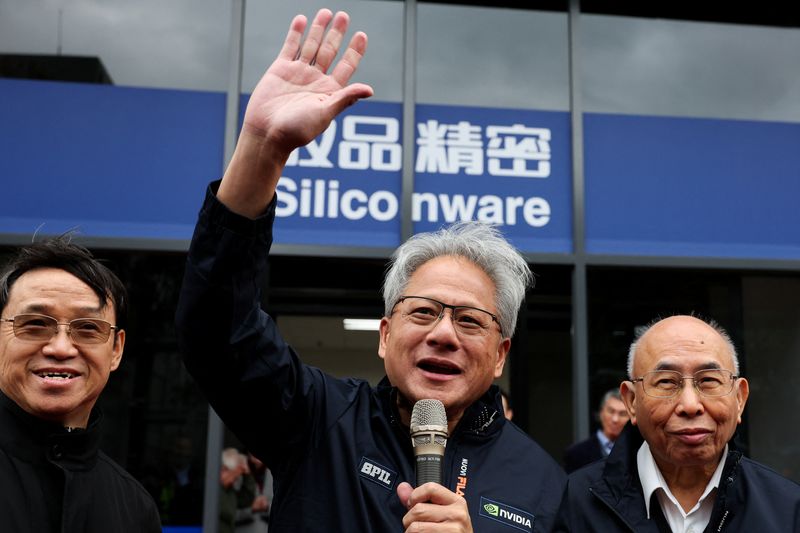By Wen-Yee Lee
TAICHUNG, Taiwan (Reuters) - Nvidia (NASDAQ:NVDA)'s demand for advanced packaging from TSMC remains strong though the kind of technology it needs is changing, the U.S. AI chip giant's CEO Jensen Huang said on Thursday, after he was asked whether the company was cutting orders.
Nvidia's most advanced artificial intelligence (AI) chip, Blackwell, consists of multiple chips glued together using a complex chip on wafer on substrate (CoWoS) advanced packaging technology offered by Taiwan Semiconductor Manufacturing Co (TSMC), Nvidia's main contract chipmaker.
"As we move into Blackwell, we will use largely CoWoS-L. Of course, we're still manufacturing Hopper, and Hopper will use CowoS-S. We will also transition the CoWoS-S capacity to CoWos-L," Huang said on the sidelines of an event by chip supplier Siliconware Precision Industries in Taiwan's central Taichung city.
"So it's not about reducing capacity. It's actually increasing capacity into CoWoS-L."
Hopper refers to Nvidia's GPU architecture platform before it announced Blackwell in March 2024.
Nvidia has so far relied mainly on one type of CoWoS technology, CoWoS-S, to combine its AI chips.
TF International Securities analyst Ming-Chi Kuo on Wednesday said Nvidia was shifting its focus to a newer type of technology, CoWoS-L, and that suppliers would be affected.
In addition, Taiwan media reported that Nvidia was cutting CoWoS-S orders from TSMC in a potential hit to the Taiwanese chip foundry's revenue.
Nvidia has been selling its Blackwell chips as quickly as TSMC can make them but packaging has remained a bottleneck due to capacity constraints.
Still, Huang said that the amount of advanced packaging capacity was "probably four times" the amount available less than two years ago.
He declined to answer questions on the new U.S. export restrictions that limit AI chip exports to most countries except for a select group of close U.S. allies including Taiwan.

Huang is also expected to attend Nvidia Taiwan's annual new year party this week in Taipei.
Huang, who was born in the southern city of Tainan, Taiwan's historic capital, before emigrating to the United States at the age of nine, is hugely popular in Taiwan with his every move breathlessly followed by local media.